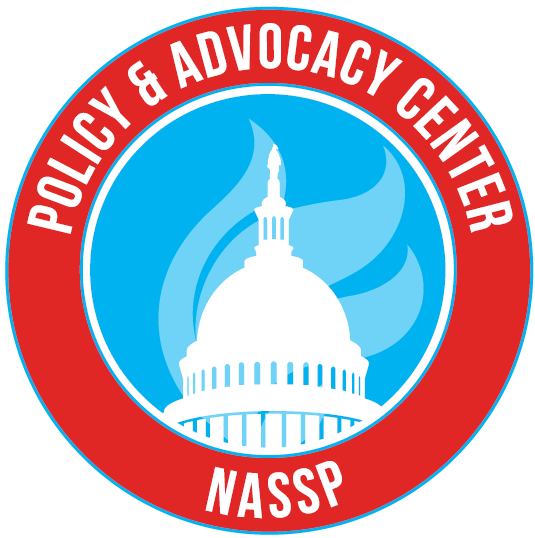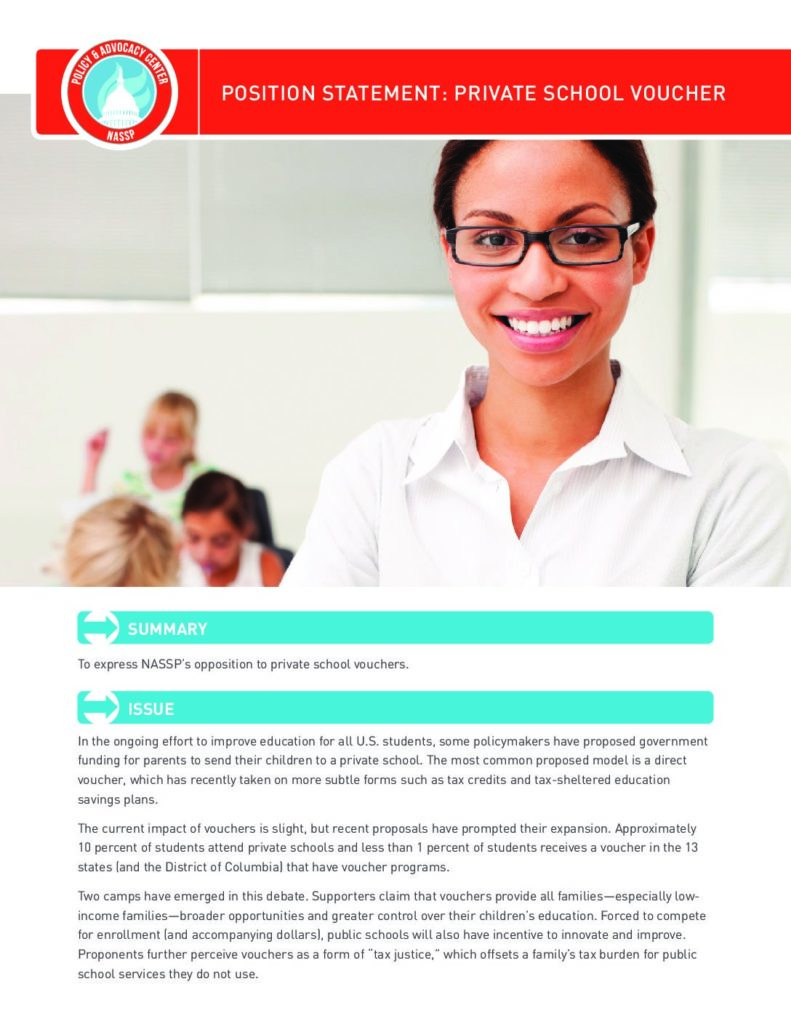To express NASSP’s opposition to private school vouchers.
In the ongoing effort to improve education for all U.S. students, some policymakers have proposed government funding for parents to send their children to a private school. The most common proposed model is a direct voucher, which has recently taken on more subtle forms such as tax credits and tax-sheltered education savings plans.
The current impact of vouchers is slight, but recent proposals have prompted their expansion. Approximately 10 percent of students attend private schools and less than 1 percent of students receives a voucher in the 13 states (and the District of Columbia) that have voucher programs.

Two camps have emerged in this debate. Supporters claim that vouchers provide all families—especially low-income families—broader opportunities and greater control over their children’s education. Forced to compete for enrollment (and accompanying dollars), public schools will also have incentive to innovate and improve. Proponents further perceive vouchers as a form of “tax justice,” which offsets a family’s tax burden for public school services they do not use.
The conclusions derive in part from an ideology that favors the outsourcing of public functions to private entities, often called privatization. There is evidence, in fact, that privatization of various government services reduces costs, increases efficiency, and leads to greater government responsiveness. But the history of education privatization tells a different story. Tracing the history of school privatization in his book Education and the Commercial Mindset, Samuel Abrams (2016) concludes that education is too complex an endeavor to squeeze into a service contract with sufficient specificity. We therefore judge those schools’ performance only by the most prominent metrics. The absence of even those metrics creates the conditions in which fraud can flourish (p. 11).
All the while, voucher opponents assert, private school vouchers divert much-needed funding from public schools. With fewer resources, public schools that are already struggling may be hard-pressed to sustain their infrastructure, let alone advance reform efforts designed to boost student achievement. Yet, private schools receiving the vouchers are not bound by the accountability or reporting requirements assigned to their public counterparts. Private schools have the added advantage of selecting students by income, test scores, gender, or religion.
Private schools can even consider whether a student has special needs in their enrollment decisions. Special needs students who do enroll in private schools completely abdicate their federal protections under the Individuals with Disabilities Education Act in all but four states.
Yet, despite private schools’ autonomy, opacity, and selective enrollment, rigorous, randomized studies to test the impact of voucher programs have demonstrated that voucher programs do not improve student achievement. In fact, the most recent studies of programs in Louisiana and Ohio indicate that voucher students actually perform worse than their public school counterparts. And although the private schools demonstrate somewhat better success in graduating students, voucher programs do not result in improved student achievement.
Public schools, on the other hand, embrace their mandate to provide all students with access to rigorous coursework that prepares them for success in college and the workforce, regardless of their background and special needs status. Public school services are transparent and held to high standards of accountability, while also complying with the requirements of the Every Student Succeeds Act, the Individuals with Disabilities Education Act, and the Americans with Disabilities Act.
Guiding Principles
NASSP believes that:
- Private school vouchers drain money away from public schools; have not conclusively been proven to result in increased student achievement; reduce accountability in the education system; and ultimately harm public schools, which the vast majority of students attend.
- School choice is appropriate within the public school system as long as equal opportunity and access are ensured without discrimination on the basis of race, gender, socioeconomic status, or disability; accountability requirements are consistently applied; and autonomy is accompanied by complete transparency to allow all schools to learn lessons from the chosen school’s practice.
Recommendations
- Federal and state policymakers should support public education as a means to grow their economies and help create well-educated citizens.
- Federal policymakers should resist attempts to provide federal funds for private school vouchers and their variants, including tuition tax credits for private schools.
- Federal and state policymakers should focus on sustained school improvement efforts coupled with support mechanisms to help all students achieve at higher levels and close achievement gaps.
Resources
Abrams, S. (2016). Education and the commercial mindset. Cambridge, MA: Harvard University Press.
Almazan, S., & Marshall, D. (2016). School vouchers and students with disabilities: Examining impact in the name of choice. Towson, MD: Council of Parent Attorneys and Advocates.
Center for Public Education. (2017). School choice: What the research says. Alexandria, VA: National School Board Association.
Harris, H. N. (2017). Why managed competition is better than a free market for schooling. Brookings Institution. Retrieved from https://www.brookings.edu/opinions/why-managed-competition-is-better-than-a-free-market-for-schooling/
Hinnefeld, S. Study confirms voucher programs discriminate [Blog post]. Retrieved from https://inschoolmatters.wordpress.com/2017/01/30/study-confirms-voucher-programs-discriminate/
Institute of Education Sciences (2017). Evaluation of the D.C. Opportunity Scholarship Program: Impacts after one year. Retrieved from https://ies.ed.gov/ncee/pubs/20174022/pdf/20174022.pdf
Murray, P. (March 22, 2017). Real choice vs. false choice: The repercussions of privatization programs for students, parents, and public schools [Memorandum]. Senator Patty Murray to Senate colleagues.

